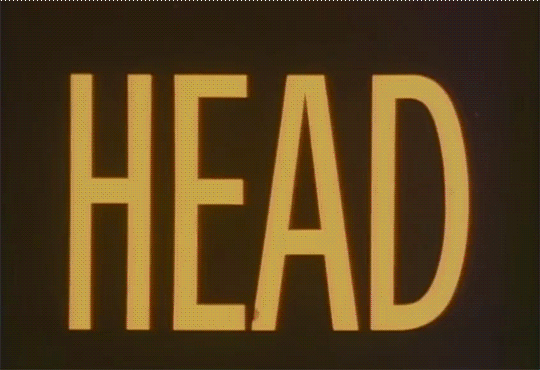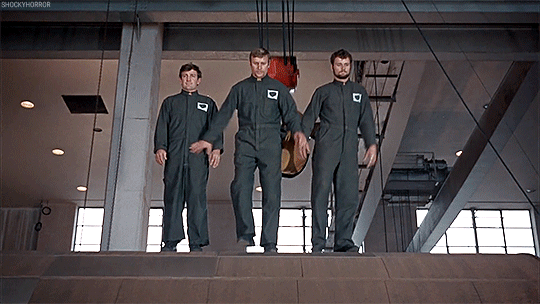From the minds of Jack Nicholson and Bob Rafelson, is a 110 minute acid trip featuring The Monkees. Their television show had been recently cancelled, and Head is essentially their former-Disney star “I’m an adult!” moment in an attempt to break free of their preassigned roles and become Serious Artists.

I cannot adequately express the despair I felt when Head literally announced there would be no plot to this movie, and would instead be a series of skits. It makes sense in the context of The Monkees, since they were formed for a television show. Each section of the movie has a different genre, ranging from a traditional Western, a boxing movie, a television commercial, a stage-performed musical number, horror… they are all here, which makes an overall narrative pretty hard to discern, other than The Monkees’ general discontentment with their current position.
It begins similarly to A Hard Day’s Night, where the Monkees are being chased by… we don’t know what yet, but we can assume it is not excited teenage girls. They then launch themselves off of a bridge, trip on LSD, find some mermaids, and hold a kissing contest that only triggered my Covid-spread panic. The movie doesn’t give you much time to breathe before it comes in hot with a football player attacking soldiers, a football stadium cheering for war, and The Monkees playing a live concert with a screaming crowd cut together with scenes of civilians being killed during the Vietnam war.
Not gonna lie, I didn’t think I’d have to address the Vietnam War at all during this project (unfortunately, Meet the Feebles took that assumption away from me rather quickly). To be honest, I was really expecting this more from The Beatles, especially with John Lennon’s very famous pivot to anti-war protest songs. In college, I wrote a sociology paper on the Vietnam War’s influence on popular culture and the function of the media created, and not once in all my research were The Monkees even seriously cited, other than some coy allusion that “Last Train to Clarksville” might have had something to do with a soldier travelling to an army base. I was so taken aback by the opening scene of this movie, that I literally pulled out my paper and the books I had purchased to write it to see if I had missed something. There was ONE sentence about Mike Nesmith singing a protest song before he joined The Monkees. Granted, if you were alive during the 1960s, to be ignorant of the war in general would have been so incredibly tone-deaf. Had I realized this movie would be political in any way, I would have expected this. In one book, the author had compiled over 750 songs that directly addressed the war. Record sales tripled during the decade, and Woodstock might be the most famous festival we’ve ever held in the US – processing the war through music was very much *a thing*. So, of course, I had to dive into this, because my brain can’t just be like, “Well, I guess The Monkees hated the Vietnam War like the majority of the population, I guess.”
There wasn’t much to find, other than this bizarre clip of Davey Jones on an 80s talk show bragging and singing about how he had evaded the draft. Turns out, the writer/director of this picture, Bob Rafelson, really controlled the message of this movie, and he inserted these scenes as commentary on the performative aspect of war, and how television “…makes you inured to the realities of life. Oh yes, it brings it into the living room, but then you don’t have to fucking deal with it. There is no distinction made between the close-up of the young girl responding hysterically to the appearance of The Monkees and to the shot of the assassination at the same time. And then the hysterical girls attack the stage where The Monkees are playing and shred their clothing off. But they’re not The Monkees, they are wooden dummies. They’ll shred anything, as long as it’s the thing to do. Rape the stage, attack the musicians, real or unreal, who cares? And it was just pointing out that there was a sort of a mindlessness to, as The Beatles used to complain all the time, to the appreciation of the music.”
There’s a lot going on in this statement… I’ll agree that the constant barrage of violence and unrest eventually numbs you to it. Especially now, with a 24-hour news cycle, and twitter just bombarding you with every fucking egregious thing going on in the world at once. A sense of hopelessness overtakes you; The doom-scrolling will only pacify you into not acting, because what the fuck can you do to change anything? There are too many problems, and they’re too large to solve on your own.
The second part of this statement, where teenage girls will do anything “as long as it’s the thing to do” is pretty insulting. I suppose the attitude of teenage girls being easily manipulated to enjoying things was amplified with Beatlemania. Its continued on, where bands like New Kids on the Block, The Backstreet Boys, and One Direction are immediately dismissed as superfluous because teenage girls like them, and teenage girls are shallow because they’re driven by their hormones. What’s unbelievably frustrating about this mindset is it has been disproved time and time again, INCLUDING with The Beatles. I know more dudes who rep for them than I do women. Shit, in this dumpster fire of a year, Harry Styles’ new album has been one of the few positive things that has kept me going, and that came out 10 months ago. With the success of k-pop as well, a lot more people are starting to come around to “manufactured content that teenage girls like can be good, actually”.
The Beatles complaining about how their music is secondary to the mania about them is really rich, considering their legacy now. It’s not like they were that attractive or charming… I sat through 2 of their movies and the only person I even mildly connected with was Ringo, because he was a goofy dope. I’m fairly certain teenage girls were buying their records and going to their shows because they liked the music. As a former teenage girl, let me tell you, the illusion of depth and sensitivity is way more attractive than a pretty face.
Teenage girls made The Monkees and The Beatles successful, and for the director, who directly profited off of that success, to make a movie that criticizes them really rubs me the wrong way. Also, it was the fucking 1960s, about as volatile of a decade as you could get *until* now. Maybe teenage girls focused so much on The Monkees and The Beatles because it was one of the few uncomplicated things that could bring them reprise from the violence unfolding around them. But whatever, disparage their money lining your pockets, I guess.
The skits afterward are pretty unremarkable. Micky is in the middle of a desert trying to get happiness out of a Coke machine, only to find it, and the task itself empty. He then blows up the Coke machine with a tank given to him by the Italian army.

The Monkees are given a tour of a manufacturing facility, only to see what they are producing isn’t a quality product, and the workers themselves are either fake, or endangered by the endeavor. There’s a few scenes where they fight against their predetermined personalities in the band, or what their fans might think of their behaviors. They are used in a dandruff shampoo advertisement and vacuumed up and held hostage in a black box. There is an outstanding upbeat musical number performed by Davy (and Toni Basil!) about a boy whose father left him. He lays it all out on the dance floor, only to be criticized by Frank Zappa of all people, for not having a message in his music that will save the youth of America.
While they are searching for answers on how to escape the box they’re trapped in, or purpose in what they’ve accomplished, they find nothing. Peter tries to enlighten them with a bunch of culty bullshit, but instead Davy loses his shit and starts physically attacking literally everything featured throughout the movie, culminating in The Monkees running from their movie studio and jumping off a bridge to free themselves. They unfortunately are captured and shoved back in the black box, awaiting the next time they will be carted out to market something else for The Teens to buy.

I probably don’t need to tell you that this movie flopped. The studio purposely left The Monkees out of all the promotional material because they thought it might detract from the serious motion picture they were trying to release. The problem with this, however, is if you don’t know anything about The Monkees, this movie is not going to make sense to you. I had to watch several behind-the-scenes clips to get any semblance of an idea what they were trying to achieve. Sure, the Capitalism and Manufactured Entertainment is Bad theme is pretty easy to pick out, but why The Monkees were the ones saying this after being immersed in the middle of it for three years is an important position to understand beforehand. And even if you were a Monkees fan, like my mother was, this basically shits on their entire experience in show business, so it probably doesn’t hit too well with their core demographic, either. I respect what they were trying to do here, but it’s no mystery to me why this movie has almost entirely been lost to time.
I’d like to say this ends my series on rock bands that decided to make musical movies, but next on the list is a little story about a pinball-wizard-that-could, Tommy.
